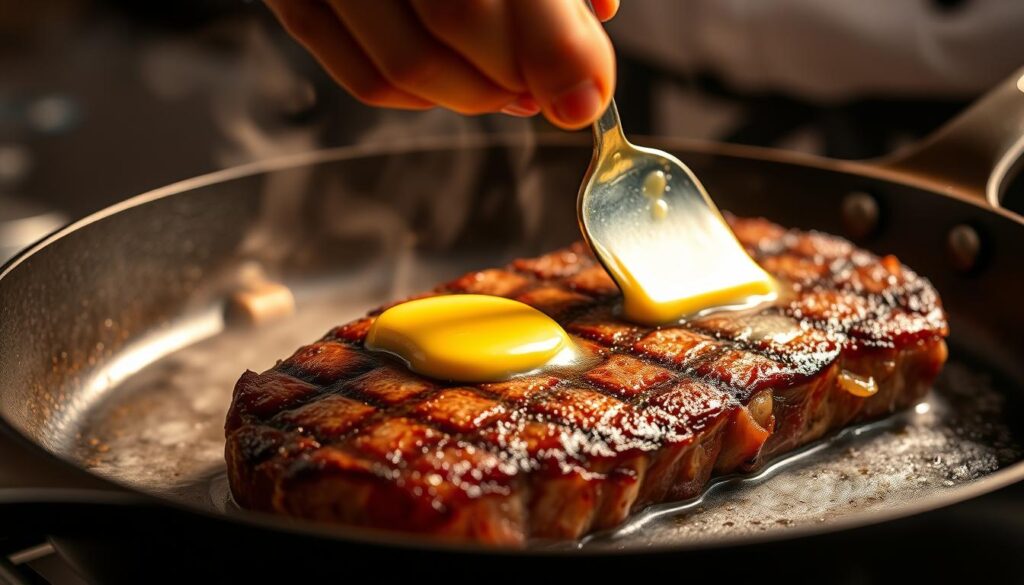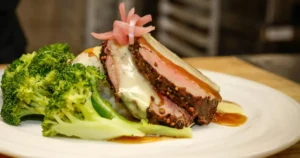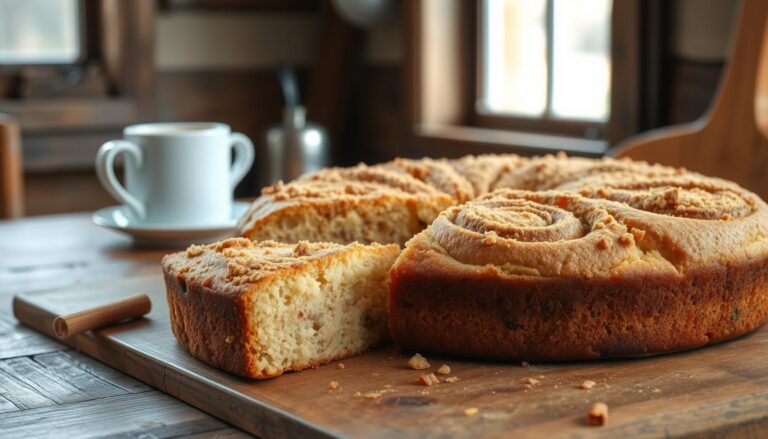How to Make The Perfect Pan Seared Steak ?
How to Make The Perfect Pan Seared Steak ?
The sizzle of a perfect pan seared steak can turn a simple dinner into a special meal. As someone who’s worked hard to get better at cooking steak, I know the magic of great meat and the right cooking method.
It’s not just about following a recipe to make the perfect pan seared steak. It’s about learning a skill that makes your cooking better. This recipe needs precision, patience, and some key techniques to make an ordinary steak taste like it’s from a restaurant.
Whether you’re new to cooking or have been doing it for years, these tips will help you make a delicious steak. You’ll be able to make steakhouse-quality meals right in your kitchen with the right approach.
Key Takeaways
- Master the art of pan searing for restaurant-quality steaks at home
- Choose high-quality cuts like ribeye or strip steak
- Understand the importance of proper temperature and timing
- Learn techniques for achieving the perfect sear and doneness
- Discover how to rest and season your steak for maximum flavor
Understanding the Basics of Steak Cuts
Choosing the right steak cut is key to cooking a perfect steak on the stove. Not all beef cuts are the same. Knowing the differences can make your steak searing techniques better.
Popular Cuts for Pan Searing
Some cuts are better for pan searing because of their great qualities:
- Ribeye: Known for incredible marbling and rich flavor
- New York Strip: Balanced tenderness and robust beef taste
- Filet Mignon: The most tender cut, with minimal connective tissue
- Top Sirloin: A versatile and more affordable option
Choosing the Right Thickness
Steak thickness is important for cooking results. Aim for cuts between 1-1.5 inches thick. Thicker steaks get a perfect sear and stay juicy inside.
Importance of Marbling
Marbling—those white streaks of fat within the muscle—is key to flavor and tenderness. Cuts like ribeye, with lots of marbling, offer a rich, buttery texture when cooked.
Pro tip: Look for steaks with fine, evenly distributed fat marbling for the best results.
Essential Tools for Pan Searing
To get the perfect sear on steak, you need more than skill. You also need the right kitchen tools. Knowing the essential equipment will help you master pan seared steak methods with confidence.
The Right Pan: Cast Iron vs. Stainless Steel
Choosing the right pan is key. Cast iron and stainless steel pans have their own benefits. Cast iron skillets hold heat well and cook evenly. They create a great crust on your steak.
- Cast Iron Advantages:
- Superior heat retention
- Natural non-stick surface when properly seasoned
- Develops a beautiful exterior crust
- Stainless Steel Benefits:
- Lighter weight
- Easy to clean
- More responsive to temperature changes
Cooking Thermometer: Why You Need One
A reliable meat thermometer is essential for the right steak doneness. It’s all about precision for that perfect medium-rare or medium finish.
| Doneness | Internal Temperature | Cooking Time |
|---|---|---|
| Rare | 125°F | Approximately 6 minutes |
| Medium-Rare | 130°F | Approximately 8 minutes |
| Medium | 140°F | 9-10 minutes |
Other Helpful Kitchen Gadgets
Adding these tools to your steak-cooking arsenal can help:
- Long-handled tongs for safe turning
- Digital kitchen timer
- Basting spoon
- Heavy-duty oven mitts
Pro tip: Invest in quality tools to improve your steak-cooking technique and consistency.
Preparing Your Steak for Cooking
Mastering pan seared steak starts with careful preparation. The steps before cooking greatly affect the steak’s taste and texture. To sear steak right, you need to pay attention and use key techniques.
Seasoning Strategies
Choosing the right seasoning can turn a regular steak into a gourmet meal. Here are some seasoning ideas:
- Simple salt and pepper method
- Specialty dry rubs
- Herb-infused seasoning blends
Experts say to salt your steak at least 40 minutes before cooking. This lets the salt soak into the meat, boosting flavor and helping create a great crust.
Temperature Matters
Bringing your steak to room temperature is key for even cooking. A steak left out for an hour will only get to 52°F at its center. Try to take the steak out of the fridge 30-60 minutes before cooking for better heat distribution.
The Importance of Drying
Drying your steak is crucial for a perfect sear. Too much moisture stops the steak from browning well and can make it steam instead of crisp up. Use paper towels to dry the steak completely, removing moisture that hinders the Maillard reaction.
Pro tip: The drier the surface, the better the crust!
By following these steps, you’ll be on your way to making a top-notch steak in your kitchen.
The Cooking Process Explained
Mastering the ultimate pan seared steak guide is all about the details. Cooking the perfect steak on the stove is an art. It needs precision and technique.
Preheating Your Pan: Tips and Tricks
Getting the pan to the right temperature is key for a perfect sear. For cast iron skillets, preheat to 500°F in 20-25 minutes. This temperature gives a crispy outside and a tender inside.
- Heat pan to 500°F (260°C)
- Use oils with high smoke points like refined avocado oil
- Ensure even heat distribution
The Art of Searing: Timing Matters
Timing is crucial when cooking the perfect steak. For steaks 1-1.5 inches thick, sear for 3-4 minutes on each side at high heat. Flipping often can cut cooking time by 30% and ensure even browning.
- Sear first side for 3-4 minutes
- Flip only once or twice
- Adjust heat as needed
How to Flip Your Steak Properly
Flipping your steak right is key in the ultimate pan seared steak guide. Use tongs to flip the steak gently. This helps get a golden-brown crust. Minimize flipping to maintain the perfect sear.
Pro tip: Let the steak develop a natural crust before flipping
Cooking the perfect steak on the stove takes patience, precision, and practice. Every flip and cooking moment adds to the final delicious dish.
Achieving Perfect Doneness
Learning How to Make The Perfect Pan Seared Steak means knowing steak temperatures well. The secret to a tasty steak is getting it to the right doneness. This keeps the flavor and texture just right.
For the best pan seared steak tips, knowing the exact internal temperatures is key. Each doneness level offers a unique taste:
- Rare: 125°F – Deep red center, very soft texture
- Medium-Rare: 135°F – Warm red center, most popular doneness
- Medium: 145°F – Pink center with more firm texture
- Medium-Well: 150°F – Slight pink center
- Well-Done: 160°F – No pink, completely cooked through
Using a Meat Thermometer Effectively
A meat thermometer is your best friend for perfect steak doneness. Stick the thermometer into the thickest part of the steak, avoiding fat or bone. Take the steak off the heat 5-10 degrees before your target temperature. This is because the temperature will rise a bit more after it’s removed.
Pro Tip: Let your steak rest for 5-10 minutes after cooking. This lets the juices spread out, making the steak more tender and flavorful.
Basting for Extra Flavor
Improving your steak cooking skills is more than just cooking the meat. Basting is a pro technique that turns a simple steak into a gourmet dish. It adds moisture, depth, and amazing flavor to your dish.

Basting involves spooning hot butter and herbs over the steak. This method spreads heat evenly, makes a golden crust, and adds rich flavors to the meat.
Why Basting Matters
- Enhances moisture retention
- Creates a more complex flavor profile
- Helps achieve a perfect exterior crust
- Promotes even cooking
Selecting the Perfect Butter and Herbs
Choosing the right ingredients for basting is key. Unsalted butter lets you control the seasoning. Here are some top herbs:
- Fresh thyme
- Rosemary sprigs
- Fresh garlic cloves
- Fragrant sage leaves
For the best taste, use 2 tablespoons of unsalted butter. Baste for about 1 minute at the end of cooking. This will make your steak a standout dish.
Resting Your Steak
Mastering pan seared steak is more than just cooking. It’s also about what happens after you take it off the heat. Resting your steak is key to turning a good meal into a great one.
Why Resting Matters
Cooking a steak makes the meat’s muscle fibers contract. This pushes juices to the center. Resting lets these juices spread out evenly, making the steak:
- More tender
- More flavorful
- Moist all the way through
The Perfect Resting Method
Celebrity chef Anthony Bourdain had a simple method for resting. Put your seared steak on a cutting board at room temperature. Leave it uncovered for the best results.
| Steak Thickness | Recommended Resting Time | Temperature Rise |
|---|---|---|
| 1-inch thick | 5-7 minutes | 3-5°F |
| 1.5-inch thick | 7-10 minutes | 5-7°F |
Resting Tips for Seared Steak Done Right
Here are some tips for resting your steak:
- Don’t cover the steak with foil, as it keeps cooking
- Rest the steak at room temperature
- Wait before cutting into the steak
By using these tips, you’ll get a juicy, tender, and delicious pan seared steak.
Delicious Sauces to Elevate Your Steak
Turning your pan seared steak into a masterpiece often depends on the sauce. A great sauce can make your steak go from good to amazing. It turns a simple meal into a fancy dish.
Classic Pan Sauce Recipe
After cooking your steak, the browned bits in the pan are full of flavor. Here’s how to make a top-notch pan sauce:
- Deglaze the pan with 1-2 teaspoons of balsamic vinegar
- Add 2 crushed garlic cloves
- Pour in ½ cup of light cream
- Whisk until smooth and slightly thickened
Garlic Herb Butter Sauce
A garlic herb butter can make your steak even better. This sauce is easy to make:
- Soften unsalted butter at room temperature
- Mix in 6 minced garlic cloves
- Add 6-8 fresh thyme sprigs (or rosemary)
- Season with salt and pepper
“The right sauce can transform a good steak into an unforgettable dining experience.”
| Sauce Type | Preparation Time | Key Ingredients |
|---|---|---|
| Classic Pan Sauce | 5-7 minutes | Balsamic vinegar, cream, garlic |
| Garlic Herb Butter | 3-5 minutes | Butter, garlic, fresh herbs |
Pro tip: Always make your sauce in the same pan as your steak. This way, you get all the rich, caramelized flavors. Your taste buds will love it!
Serving Suggestions
Creating the perfect pan seared steak experience is more than just cooking. The right side dishes and presentation can make your meal unforgettable. Here are some best pan seared steak tips for serving and plating.

Complementary Side Dishes
Choosing the right sides can change your dining experience. Pick dishes that complement and enhance your steak’s rich flavor.
- Roasted seasonal vegetables
- Creamy mashed potatoes
- Fresh garden salads
- Garlic butter asparagus
- Crispy roasted Brussels sprouts
Elegant Plating Techniques
Presentation is key when serving your steak. Follow these tips to impress your guests:
- Slice the steak against the grain for tenderness
- Use a clean, white plate to show off the steak’s color
- Arrange side dishes around the meat
- Garnish with fresh herbs for a pop of color
| Steak Cut | Recommended Side Dish | Serving Size |
|---|---|---|
| Ribeye | Roasted Garlic Potatoes | 8 ounces per person |
| Filet Mignon | Grilled Asparagus | 6 ounces per person |
| New York Strip | Creamy Spinach | 12 ounces per person |
The secret to an amazing steak dinner is balancing flavors, textures, and looks. With these serving suggestions, you’ll make a meal that will be remembered.
Common Mistakes to Avoid
Getting the perfect sear on steak is more than just throwing meat in a hot pan. Many home cooks make big mistakes that ruin a great meal.
When cooking steak on the stove, several mistakes can mess up your meal:
- Overcooking the steak
- Skipping the crucial resting phase
- Using incorrect heat levels
- Neglecting proper seasoning
The Perils of Overcooking
Overcooking is a big mistake for steak fans. A few extra minutes can turn a tender steak into a tough, dry piece of meat. Always use a meat thermometer to check the internal temperature. Take the steak off the heat a bit before it reaches your desired doneness.
The Importance of Resting
Not resting the steak is another big mistake. When you cook a steak, the heat pushes juices to the center. Cutting it right away lets these juices run out, making the steak dry and less flavorful. Let your steak rest for 5-10 minutes to let the juices spread and make it tender.
Pro tip: Tent your steak with aluminum foil during the resting phase to keep it warm without continuing to cook.
Additional Cooking Pitfalls
Besides overcooking and not resting, watch out for these mistakes:
- Not preheating the pan enough
- Using the wrong type of oil
- Overcrowding the cooking surface
- Flipping the steak too often
By avoiding these mistakes, you’ll make a steak as good as a restaurant’s in your own kitchen.
Cleaning and Maintaining Your Pan
Keeping your pan in good shape is key to making great pan-seared steaks. Your cooking tools need special care to last long and work well.
How you clean and take care of your cookware affects your cooking. Each type of pan needs its own care to stay in top shape.
Proper Care for Cast Iron
Cast iron skillets are known for lasting a long time. Lodge has made them since 1896. Here are some tips to keep them in great condition:
- Never use soap when cleaning cast iron
- Dry thoroughly after washing to prevent rust
- Apply a thin layer of oil after cleaning
- Store in a dry place
Pro tip: A well-maintained cast iron skillet can last multiple generations, making it an excellent investment for serious home cooks.
Cleaning Stainless Steel Pans
Stainless steel pans need different care than cast iron. They can handle tougher cleaning without losing their shine or cooking power.
- Use mild dish soap and warm water
- Avoid abrasive scrubbers
- Dry immediately to prevent water spots
- Polish occasionally with stainless steel cleaner
By following these tips, your cookware will stay in top shape. This means it will be ready for your next cooking project.
Frequently Asked Questions
Creating the perfect seared steak can seem tricky. But, with the right tips, you’ll get it right every time. Understanding steak preparation and storage is key.
Leftover steak can be stored in an airtight container in the fridge for 3-5 days. To reheat, use gentle methods like a low-temperature oven or quick skillet reheating. This keeps the steak tender and prevents overcooking.
Storing Leftover Steak
Refrigeration is good for short-term storage, but freezing is better for longer. You can freeze steak for up to 3 months, though the texture might change a bit. Wrap it tightly in freezer-safe packaging to keep quality high and prevent freezer burn.
Cooking Fat Alternatives
Olive oil is a great choice if you avoid dairy. It has a high smoke point, making it perfect for searing. While butter adds rich flavor, olive oil is a healthier option without losing the seared steak technique.
FAQ
What is the best cut of steak for pan searing?
How long should I let my steak come to room temperature before cooking?
What’s the ideal pan temperature for searing a steak?
How do I know when my steak is cooked to the right doneness?
How long should I rest my steak after cooking?
Can I use olive oil instead of butter for pan searing?
How do I store leftover steak?
What’s the best way to season a steak?
How do I clean a cast iron pan after cooking steak?
What wine pairs well with a pan-seared steak?
Source Links
- The PERFECT Pan-Seared Steak (6 Tips from a Chef) – https://thrivinghomeblog.com/how-to-make-the-perfect-pan-seared-steak/
- Perfect Pan Seared Steak Recipe – Savory Nothings – https://www.savorynothings.com/perfect-pan-seared-steak/
- Your Guide To Different Cuts Of Steak – Tasting Table – https://www.tastingtable.com/695592/steak-guide-cuts-types/
- Meat Department Basics: A Guide to Beef Cuts – Farmer Joe’s – https://farmerjoes.com/meat-department-basics-a-guide-to-beef-cuts/
- For Flawlessly Seared Steak, Use My Easy 3-Step Trick – https://www.thekitchn.com/how-to-cook-steak-on-the-stovetop-240330
- How to Cook the Perfect Pan Seared Steak (VIDEO) – CJ Eats Recipes – https://cjeatsrecipes.com/perfect-pan-seared-steak/
- How to Sear a Steak on the Stove: Step-by-Step Instructions – https://misen.com/blogs/news/how-to-sear-a-steak-on-the-stove-step-by-step-instructions
- I Asked 4 Chefs the Best Way To Cook Steak—They All Said the Same Thing – https://www.simplyrecipes.com/best-way-to-cook-steak-chefs-8776555
- How to Sear a Steak: Mastering Cast Iron Skillet Techniques – https://misen.com/blogs/news/how-to-sear-a-steak-mastering-cast-iron-skillet-techniques
- How to Cook Steak Perfectly Every Time – https://thestayathomechef.com/how-to-cook-steak/
- 5 Best Ways To Cook Steak And 5 You Should Avoid – Tasting Table – https://www.tastingtable.com/1665426/best-and-worst-ways-to-cook-steak/
- How to Sear a Steak: The Ultimate Guide for Perfectly Cooked Steaks – https://misen.com/blogs/news/how-to-sear-a-steak-the-ultimate-guide-for-perfectly-cooked-steaks
- The Tips and Tricks to the Perfect Seared Steak – https://alessandraciuffo.com/the-tips-and-tricks-to-the-perfect-seared-steak/
- Learn How To Pan-Fry Steak Like A Restaurant Chef – https://www.delish.com/cooking/recipe-ideas/a23365148/how-to-pan-fry-steak/
- Pan Seared Steak with Garlic & Butter – https://www.chasingtheseasons.com/pan-seared-steak-with-garlic-butter/
- The Most Crucial Step For Perfect Steak, According To Anthony Bourdain – Food Republic – https://www.foodrepublic.com/1607319/anthony-bourdain-steak-resting-tip/
- How To Cook Steak On The Stove – Wholesome Yum – https://www.wholesomeyum.com/pan-seared-steak/?srsltid=AfmBOopHyplMMehrao4XbmaZ6_7RmIjLSUQ4UQS2V7yCOhxESCavIhMD
- Pan Seared Garlic Butter Steak & Mushroom Cream Sauce – https://cafedelites.com/pan-seared-garlic-butter-steak-mushroom-cream-sauce/
- Best Steak Marinade in Existence – https://www.allrecipes.com/recipe/143809/best-steak-marinade-in-existence/
- How To Cook Steak On The Stove – Wholesome Yum – https://www.wholesomeyum.com/pan-seared-steak/?srsltid=AfmBOopYXbP1B2fX1sWcQKD2hsslrtndEW8Hks4wuOiBp-JxVoxiZJ-A
- 10 Mistakes You’re Making When Cooking a Steak – https://www.insidehook.com/food/steak-cooking-mistakes-fix-them
- The Seasoning Mistake To Avoid With Pan-Seared Steaks – Tasting Table – https://www.tastingtable.com/1712035/dried-herb-mistake-seared-steak/
- Best Cast Iron Skillet Care | Cooking, Cleaning to Seasoning – https://www.justmaikacooking.com/cooks-notebook/cast-iron-skillet-care/
- Oven To Cast Iron Reverse Sear Steak Recipe – Tasting Table – https://www.tastingtable.com/1165359/oven-to-cast-iron-reverse-sear-steak-recipe/
- Cast Iron Steak: How To Cook a Delicious Steak in a Cast Iron Skillet | Caraway – https://cf.carawayhome.com/blog/how-to-cook-steak-in-cast-iron-pan/
- Pan Seared Steak – https://www.giangiskitchen.com/pan-seared-steak/
- How To Cook Steak On The Stove – Wholesome Yum – https://www.wholesomeyum.com/pan-seared-steak/?srsltid=AfmBOopuZedivHfzhwg1dNOG7mDkvILRXJRojjXGjUOCM7MPFR_Xq99f





